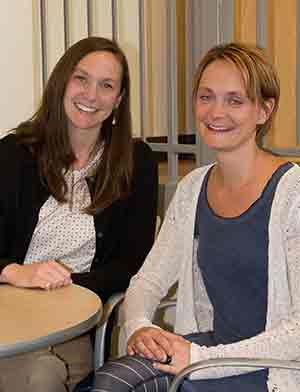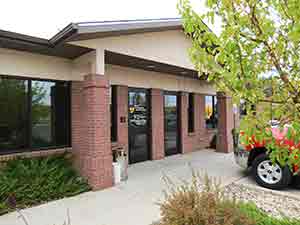UW School of Nursing, Community Health Clinic Collaborate on Behavioral Health
Published June 26, 2020

In recent years, the delivery of behavioral/mental health services has become an integral part of primary health care models throughout the country.
In response to an increasing need to serve patients who are at risk for behavioral health or substance abuse problems in a primary care setting, the University of Wyoming’s Fay W. Whitney School of Nursing and the Albany Community Health Clinic (ACHC) will implement a behavioral health integration (BHI) care model to expand a support network. The model also will elevate levels of care for patients with behavioral health problems.
Implementation of the BHI program has been made possible through a grant awarded by the U.S. Health Resources and Services Administration (HRSA), resulting in the School of Nursing receiving $1.5 million over a three-year period beginning July 1. The grant is titled “Nurse Education, Practice, Quality and Retention Interprofessional Collaborative Practice Program: Behavioral Health Integration Fund.”
The BHI program will be implemented through the ACHC and will serve Laramie and surrounding communities in Wyoming.
Nancy McGee, a psychiatric mental health nurse practitioner with the ACHC, will serve as the program director for the behavioral health initiative, with support from J’Laine Proctor. Both are Fay W. Whitney School of Nursing clinical associate professors.
“Over 30 years of high-quality research supports implementation of integrated models of care,” McGee says. “These studies demonstrate that integrated care models improved health care access, quality and satisfaction, and lowered costs.”
The BHI program is based on the evidence-based collaborative care model, first described by the University of Washington’s “Improving Mood: Providing Access to Collaborative Treatment” model, which has shown significant patient outcomes. Those include more depression-free days, improvement in physical symptoms, decreased health care costs and overall patient and provider satisfaction.
“One of the main ways we plan to initiate the BHI in the ACHC is to support the ability of our primary care providers to manage behavioral health problems within the primary care setting,” McGee says.
The clinic plans to add two new clinical positions at the ACHC: a licensed clinical social worker and a psychiatric mental health nurse practitioner. They will join a team of providers currently consisting of two family nurse practitioners and two part-time psychiatric mental health nurse practitioners, as well as a licensed professional counselor.
This expanded clinical team will work to identify patients at the ACHC who would benefit from the BHI program through screening and treatment of all patients for mental health and substance abuse risk.
Individuals who screen “at risk” for mental health and/or substance abuse problems will work closely with a registered nurse and a behavioral health care coordinator to help the patients self-identify physical and behavioral health goals, and to address health priorities.

“The BHI model provides a framework for close collaboration between all members of the team,” McGee says. “Family nurse practitioners will seek routine expert consultation from the psychiatric mental health nurse practitioners to assist in the management of the behavioral health and substance abuse needs of clients and reduce the number of referrals required for specialty services. This allows the psychiatric mental health nurse practitioners to have increased capacity to address the more complex behavioral health and substance abuse needs of clients.”
At the onset of the novel coronavirus pandemic, health care providers and patients quickly adapted to using telehealth as a means to communicate diagnoses and treatment. Using the BHI model, the ACHC is expanding telehealth to include telebehavioral health services.
“Our goal with the grant will be to expand these telehealth services to target critical behavioral health provider shortage areas throughout Wyoming,” McGee says. “This will further increase access to specialty behavioral health services throughout Wyoming.”
Training Opportunities
An additional component of the HRSA grant funding is development of an interprofessional training experience for students of the health sciences through precepted clinical/field experiences using the BHI model at the ACHC.
For UW College of Health Sciences students, interprofessional training is an integral part of their health education experience. As part of the BHI program, the ACHC seeks to develop an interprofessional training experience for nursing and social work students, providing established preceptors already in place at the clinic.
The academic-practice partnership with the Fay W. Whitney School of Nursing and the College of Health Sciences will assure that health science disciplines at UW will be exposed to BHI clinical experiences at the ACHC.
“Our goal is to increase training opportunities for undergraduate and graduate nursing and social work students, and to strengthen these future professionals’ ability to provide integrated behavioral health services within primary care settings,” says Sherrill Smith, Fay W. Whitney School of Nursing dean.
The ACHC will become an ideal training site for Bachelor of Science in Nursing, Doctor of Nursing Practice, Bachelor of Social Work and Master of Social Work students, Smith says.
“We would hope to eventually expand these clinical experiences to other health science and interdisciplinary students such as pharmacy, counseling and medical residents,” she adds. “The value of BHI is well established, and we recognize the importance of exposing students to a BHI model in a precepted clinical experience that will increase that future workforce’s capacity to implement BHI in their clinical practices.”
To learn more about the ACHC, visit https://albanycommunityhealthclinic.com/.

